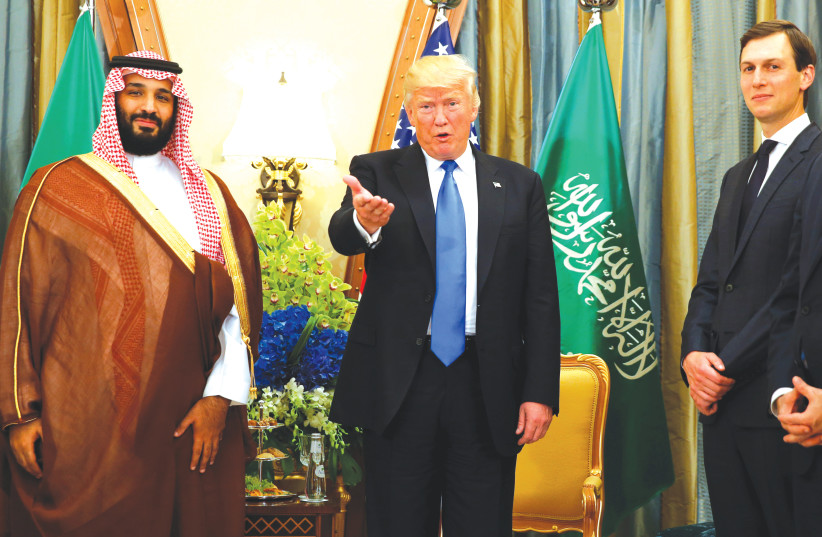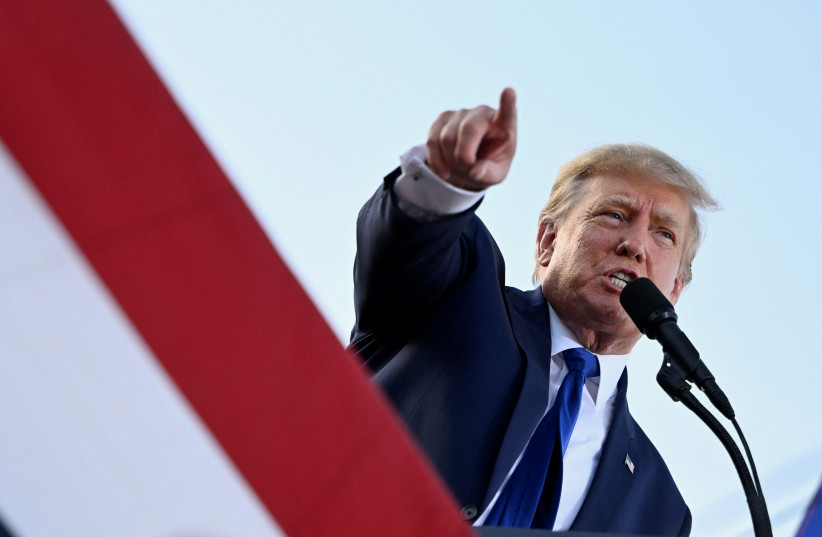The reported relationship with the Saudis puts Trump’s integrity into question as the 2024 US presidential election approaches.
By BOAZ EDIDIN
Published: FEBRUARY 14, 2023

THEN-US PRESIDENT Donald Trump, flanked by White House senior adviser Jared Kushner, meets with Saudi Arabia’s Crown Prince Mohammed bin Salman in Riyadh in 2017.
Former US president Donald Trump and his former senior advisor and son-in-law Jared Kushner are still receiving financial benefits after fostering a close relationship with Saudi Arabian crown prince Mohammed bin Salman (MBS) during their time in office, the Washington Post reported this week.
This murky relationship with the Saudis puts Trump’s integrity into question as the 2024 US presidential election approaches.
The Saudis provided both Trump and Kushner with sizable investments after their term, during which they bolstered MBS’s grip on the country by arranging that Trump’s first presidential trip be to Saudi Arabia, meeting with him in the US, and siding with him in several controversies.
Saudi Arabia's relationship with the Trump administration
Both up-and-coming proteges of powerful families, Mohammed and Kushner connected shortly after the onset of Trump’s 2016 term. Over the course of Trump’s presidency, their relationship would prove advantageous for all sides.
Trump’s support helped MBS rise to power, blockade his neighboring Qatar, and get away with his role in the murder of Washington Post opinion columnist Jamal Khashoggi. Trump and Kushner benefited from the relationship through several successful Israel-related foreign policy deals, as well as significant financial investments after his presidency.

Former US President Donald Trump speaks during a rally to boost Ohio Republican candidates ahead of their May 3 primary election, at the county fairgrounds in Delaware, Ohio, U.S. April 23, 2022. (credit: REUTERS/Gaelen Morse)
Mohammed and Kushner remained in close contact throughout the term, to the concern of his White House colleagues. Kushner kept other officials in the dark on many projects he led, according to two former White House officials who spoke on the condition of anonymity.
“I didn’t really know what Jared was doing with the Saudis,” a former White House official told the Post. “That was part of the problem. We didn’t know what Jared was doing generally. And, you know, other governments had decided that you want to get close to Trump, the way to do it is through Jared.”
Kushner’s newfound power was all the more concerning to these officials due to his lack of experience. After a 2016 post-election meeting with Kushner, Mohammed’s advisers wrote: “Kushner made clear his lack of familiarity with the history of Saudi-American relations.” In his memoir, Kushner himself wrote that he “was learning diplomacy on the fly.”
In March 2017, MBS visited D.C. and Trump and Kushner met with him against the advice of Trump's national security council. Later that month, Kushner requested that Trump choose Saudi Arabia as his first foreign destination to jump-start the administration’s Middle East policy by laying the groundwork for a diplomatic breakthrough between Saudi Arabia and Israel. MBS and the Saudis would condemn terrorism in the region, purchase US arms, and create American jobs, Kushner promised. After substantial deliberation, Trump decided to fly to Riyadh. This effort was the first of Kushner’s many favors to MBS, who utilized Trump’s visit to solidify his then-imminent rise to the crown prince.
In return, MBS gave Trump his support for an anti-terrorism center and the Abraham Accords, a deal restoring relations between Israel and the United Arab Emirates, as well as other Middle Eastern nations.
In October 2018, Khashoggi, a journalist who commonly criticized the Saudi government, was ambushed and murdered by Saudi assassins. The CIA discovered that MBS had sanctioned the operation––an accusation that put his recent rise to power at risk.
However, Trump “saved his ass,” according to Bob Woodard’s The Trump Tapes. Trump denied MBS’s involvement in the scandal, refuted the CIA’s report, and vied for continued arms sales with the Saudis.
After leaving the White House, Trump and Kushner faced pivotal financial hurdles sparked by their political polarity. Trump’s policies weren’t exactly consensus, and the January 6 attack on the capitol didn’t help his company’s already nosediving revenues. Kushner’s senior advising position put him in a similarly difficult situation.
Shortly after Trump’s term ended, Kushner created a private equity fund for which he needed investors––a seemingly suboptimal situation for someone with little-to-no experience in the private equity space. However, according to The Washington Post and the New York Times, he received a $2 billion investment from the Saudi’s Public Investment Fund, which is chaired by MBS. His firm structured the funds so that they did not have to disclose the source, using a common strategy that equity firms use to classify funding sources, The Post reported.
Four out of the five people on the Saudi fund’s advising panel spoke out against the investment in a private meeting due to Kushner’s inexperience. Nevertheless, MBS led the full board in pushing the deal towards approval, according to the New York Times.
After the PGA Tour cut ties with Trump, his golf courses began hosting tournaments for the LIV Golf, a Saudi-backed venture. Additionally, Trump closed a deal with a Saudi real estate company to build a Trump hotel as part of a $4 billion golf resort in Oman.
“The financial links between the Saudi royal family and the Trump family raise very serious issues,” said Sen. Ron Wyden (D-Ore.), the chair of the Senate Finance Committee who is investigating the Saudis’ ties with Trump and Kushner, “and when you factor in Jared Kushner’s financial interests, you are looking right at the cat’s cradle of financial entanglements.”
There are ethics laws against retired military personnel working with foreign governments like Saudi Arabia’s, yet there are none against former presidents or senior white house officials.
“I think the Congress had a certain vision in mind for what the post-presidency looks like, such as creating a library and museum and some speaking and writing a memoir,” said Don Fox, former acting director of the Office of Government Ethics. “I don’t think it ever occurred to the drafters of these ethics laws that a former president would actually try to cash in on his years of office this way.”
Mohammed and Kushner remained in close contact throughout the term, to the concern of his White House colleagues. Kushner kept other officials in the dark on many projects he led, according to two former White House officials who spoke on the condition of anonymity.
“I didn’t really know what Jared was doing with the Saudis,” a former White House official told the Post. “That was part of the problem. We didn’t know what Jared was doing generally. And, you know, other governments had decided that you want to get close to Trump, the way to do it is through Jared.”
Kushner’s newfound power was all the more concerning to these officials due to his lack of experience. After a 2016 post-election meeting with Kushner, Mohammed’s advisers wrote: “Kushner made clear his lack of familiarity with the history of Saudi-American relations.” In his memoir, Kushner himself wrote that he “was learning diplomacy on the fly.”
In March 2017, MBS visited D.C. and Trump and Kushner met with him against the advice of Trump's national security council. Later that month, Kushner requested that Trump choose Saudi Arabia as his first foreign destination to jump-start the administration’s Middle East policy by laying the groundwork for a diplomatic breakthrough between Saudi Arabia and Israel. MBS and the Saudis would condemn terrorism in the region, purchase US arms, and create American jobs, Kushner promised. After substantial deliberation, Trump decided to fly to Riyadh. This effort was the first of Kushner’s many favors to MBS, who utilized Trump’s visit to solidify his then-imminent rise to the crown prince.
In return, MBS gave Trump his support for an anti-terrorism center and the Abraham Accords, a deal restoring relations between Israel and the United Arab Emirates, as well as other Middle Eastern nations.
In October 2018, Khashoggi, a journalist who commonly criticized the Saudi government, was ambushed and murdered by Saudi assassins. The CIA discovered that MBS had sanctioned the operation––an accusation that put his recent rise to power at risk.
However, Trump “saved his ass,” according to Bob Woodard’s The Trump Tapes. Trump denied MBS’s involvement in the scandal, refuted the CIA’s report, and vied for continued arms sales with the Saudis.
After leaving the White House, Trump and Kushner faced pivotal financial hurdles sparked by their political polarity. Trump’s policies weren’t exactly consensus, and the January 6 attack on the capitol didn’t help his company’s already nosediving revenues. Kushner’s senior advising position put him in a similarly difficult situation.
Shortly after Trump’s term ended, Kushner created a private equity fund for which he needed investors––a seemingly suboptimal situation for someone with little-to-no experience in the private equity space. However, according to The Washington Post and the New York Times, he received a $2 billion investment from the Saudi’s Public Investment Fund, which is chaired by MBS. His firm structured the funds so that they did not have to disclose the source, using a common strategy that equity firms use to classify funding sources, The Post reported.
Four out of the five people on the Saudi fund’s advising panel spoke out against the investment in a private meeting due to Kushner’s inexperience. Nevertheless, MBS led the full board in pushing the deal towards approval, according to the New York Times.
After the PGA Tour cut ties with Trump, his golf courses began hosting tournaments for the LIV Golf, a Saudi-backed venture. Additionally, Trump closed a deal with a Saudi real estate company to build a Trump hotel as part of a $4 billion golf resort in Oman.
“The financial links between the Saudi royal family and the Trump family raise very serious issues,” said Sen. Ron Wyden (D-Ore.), the chair of the Senate Finance Committee who is investigating the Saudis’ ties with Trump and Kushner, “and when you factor in Jared Kushner’s financial interests, you are looking right at the cat’s cradle of financial entanglements.”
There are ethics laws against retired military personnel working with foreign governments like Saudi Arabia’s, yet there are none against former presidents or senior white house officials.
“I think the Congress had a certain vision in mind for what the post-presidency looks like, such as creating a library and museum and some speaking and writing a memoir,” said Don Fox, former acting director of the Office of Government Ethics. “I don’t think it ever occurred to the drafters of these ethics laws that a former president would actually try to cash in on his years of office this way.”
No comments:
Post a Comment